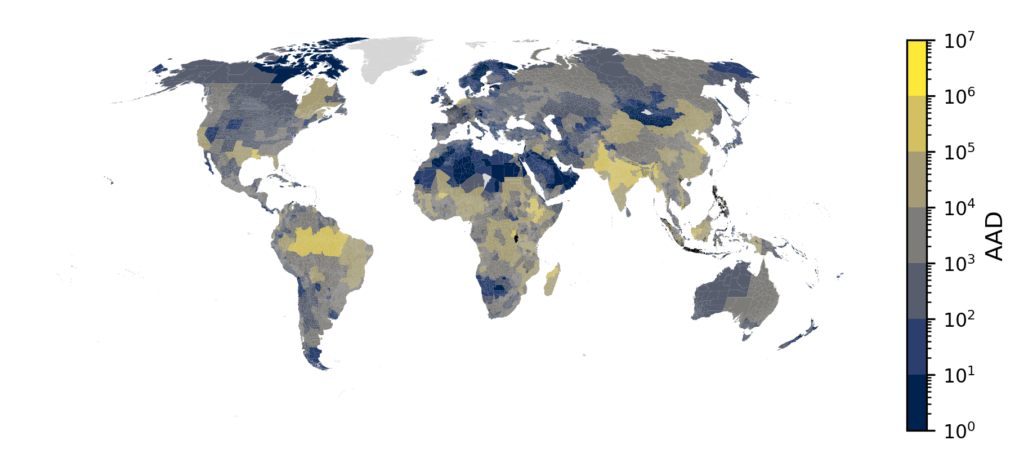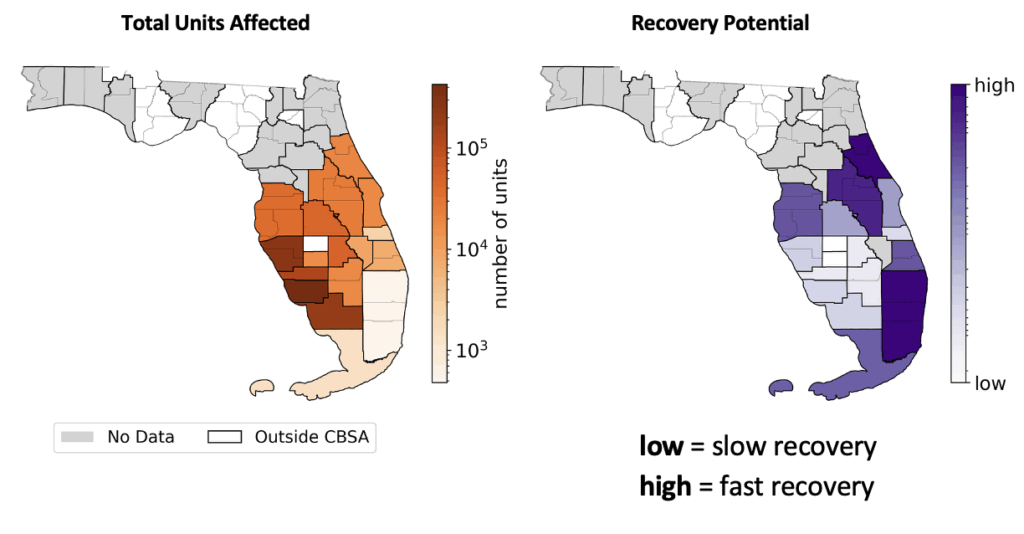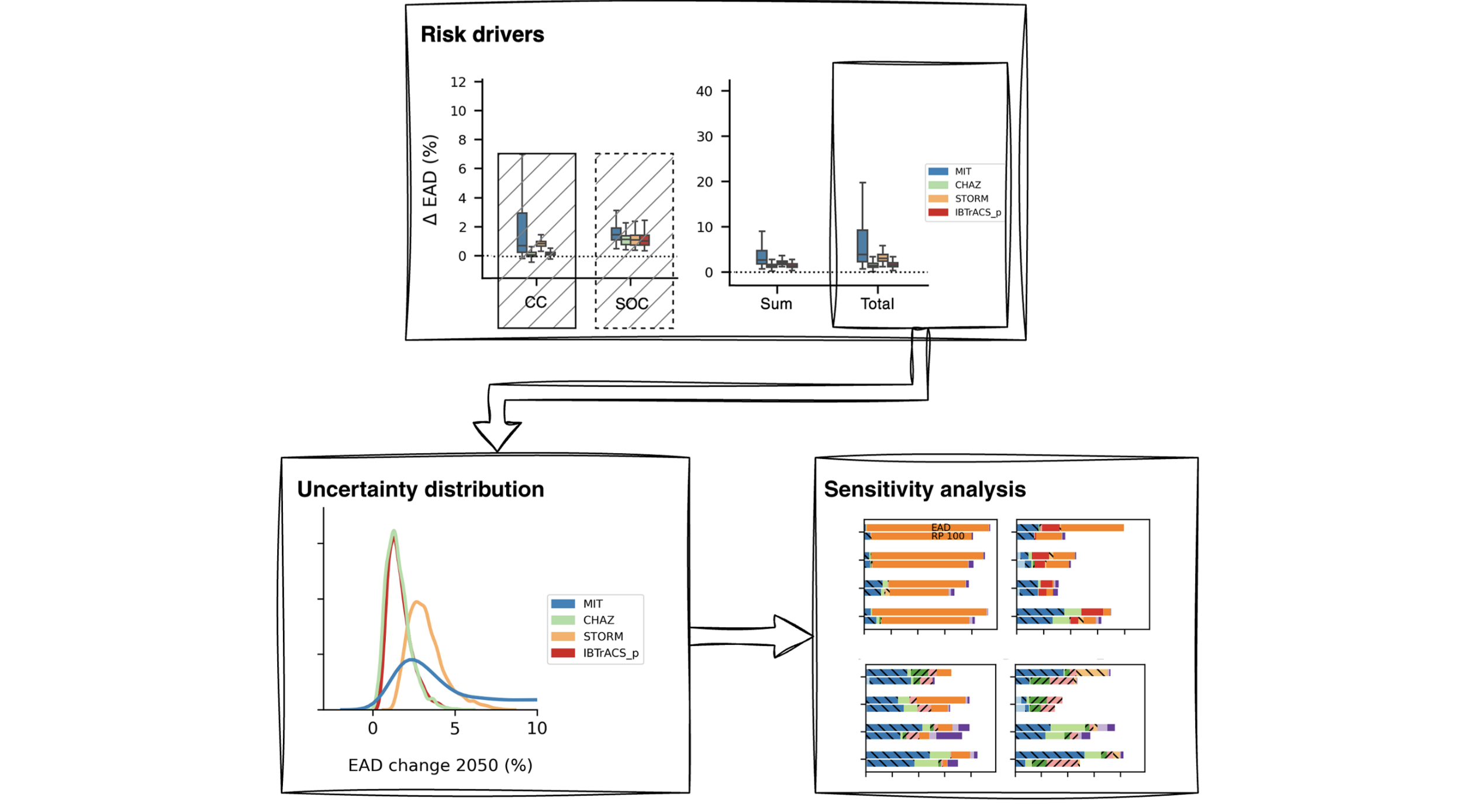Weather and climate risks are growing in severity and complexity. At the same time, the science needed to assess these risks faces persistent challenges: deep uncertainties, data gaps, and a lack of shared modeling and evaluation standards. These issues are particularly critical as climate change increases the destructive potential of extreme weather events. Robust, transparent, and systematic climate risk modeling is essential to support both research and decision-making on societally relevant questions.
My work addresses these challenges across a range of topics, from tropical cyclone impacts and human displacement risk to post-disaster recovery and systemic risks in financial systems. Below is a summary of key strands of my research.
Tropical Cyclone Risks
Synthetic tropical cyclone models are essential to compensate for limited observational data, yet their performance in risk assessments had not been systematically compared. My global intercomparison study (Meiler et al., 2022) addressed this gap and laid the foundation for deeper analysis of uncertainty in future risk projections (Meiler et al., 2023a; Meiler et al., 2023b; Meiler et al., 2025). I conducted a comprehensive uncertainty and sensitivity analysis across the full tropical cyclone risk modeling chain, accounting for multiple hazard models, climate and socio-economic inputs, and different types of uncertainty: randomness, limited knowledge, and normative choices. This work provides a structured framework for identifying dominant uncertainties and improving the robustness of tropical cyclone risk assessments.
Human Displacement
Weather-related hazards are displacing more people each year, yet global-scale assessments of displacement risk remain limited. In collaboration with the Internal Displacement Monitoring Centre (iDMC), I led the development of a globally consistent displacement risk model that integrates multiple hazards – tropical cyclones, floods, and droughts – and projects both present and future risks. Our findings suggest that current displacement risk amounts to 28.8 million people annually, potentially rising to over 80 million by 2100 under pessimistic climate scenarios. As part of this work, we conducted a methodological stocktaking of probabilistic risk modeling approaches for displacement, highlighting both challenges and opportunities to advance the field (Meiler et al., 2025).
In addition, I contributed to an intercomparison study of flood-induced displacement models in the Horn of Africa, helping define current capabilities and knowledge gaps in this emerging area of research (Zimmermann, S., et al., under review).

Recovery and Systemic Risks
Climate risk assessments have traditionally focused on direct impacts, such as economic damages or population exposure, while indirect and long-term effects remain underexplored. My work addresses this gap through two projects that examine processes downstream of disaster: post-event recovery and the propagation of systemic financial risk.
The first project explores how to integrate recovery modeling into climate risk assessment, leveraging open-source tools to simulate how communities rebuild over time. Drawing on approaches from seismic resilience modeling, this work captures the dynamics that shape recovery, including resource constraints and interdependent systems. It aims to extend the scope of climate risk assessments beyond immediate losses to reflect long-term resilience potential.
The second project investigates the flow of risk through the insurance system. I model how a major catastrophe, such as a hurricane in Florida, could trigger cascading losses across insurers, mortgage lenders, capital markets, and public institutions. By stress testing these interconnections, the project identifies failure points and evaluates systemic vulnerabilities in the broader financial system.

Additional interests
Beyond the projects outlined above, I have contributed to research on financial resilience through risk pooling (Ciullo et al., 2023), global multi-hazard risk frameworks (Stalhandske et al., 2024), and the intersection of climate impacts and public perception (Cologna et al., 2025). I am also interested in climate risk communication, decision-making under uncertainty, and the broader application of decision theory in climate adaptation.
Links to selected publications are included throughout. Feel free to reach out about ongoing work or potential collaborations, and stay tuned for updates as these projects evolve.
